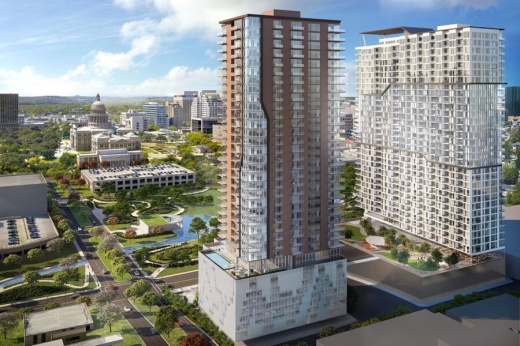After years of planning to bring new housing and community amenities to a vacant hospital property downtown, Austin has terminated talks over a development deal and is sending the process back to the drawing board—although some city officials still hope to see the current proposal move forward.
The background
The city's high-rise initiative in the growing Innovation District would replace the old HealthSouth facility at 1215 Red River St. and an adjacent garage at 606 E. 12th St. Aspen Heights Partners, the developer chosen years ago to work with Austin on the site's redevelopment, had also moved to acquire an adjacent 12th Street property to expand the project footprint.
As initially outlined, the redevelopment would've brought a pair of 37-story mixed-use towers with nearly 1,000 residences—more than 200 reserved for lower-income tenants—to downtown alongside other features, such as a new public plaza and cultural space.
The city bought the HealthSouth site in the 2010s with the intent of redeveloping it with a significant amount of affordable housing that's been in short supply downtown. The strategy was based on partnering with a private entity to create both market-rate and income-restricted units, and other community-oriented elements, all on a prime piece of city-owned land.
Austin eventually selected Aspen Heights as its collaborator. Negotiations between the two entities have stretched over the past few years to work out a project that’s financially feasible to develop with a slate of costly community benefits requested by City Council.
The HealthSouth process most recently came under public review last September after multiple extensions to the negotiating period between Austin and Aspen Heights.
Debate at that time centered on the tradeoffs needed to realize the city’s asks within the context of the current real estate market and which benefits should be added to the plan. Council eventually asked staff to work with Aspen Heights on a final master development agreement matching a detailed list of terms and other council requests.
What’s happening
Following that action, negotiations between the city and developer were extended yet again and were set to expire on June 29. Ahead of that deadline, city staff announced the deal was falling through before formally ending negotiations with Aspen Heights.
According to city officials, the partnership broke down after Aspen Heights officials determined the project outline is no longer feasible thanks to changing market conditions over the past few years.
Proposed adjustments from the developer to address those changes would have caused "significant increases in project density and complexity," Austin spokesperson Memi Cárdenas said, and wouldn't match up with the city's goals.
For example, Assistant City Manager Veronica Briseño said in a memo that a recent offer from Aspen Heights would've cut the affordable unit count from about 230 down to fewer than 70. Cárdenas also said Aspen Heights had floated an extended ground lease for the site that wasn't acceptable to the city.

That new term sheet submission was followed by a June 15 meeting between the parties, and Rojas said Aspen Heights provided further revisions on June 21. At that point, differences over the changes couldn't be worked out before the June 29 negotiating deadline.
"The deviation from housing and other anticipated community benefits proposed from the Council Approved Term Sheet and revised proposal from Aspen Heights was too extreme to overcome," Cárdenas said in an email.
Neither Aspen Heights nor a representative for the HealthSouth project responded to requests for comment as of press time.
After extending negotiations a half-dozen times over the course of several years, severing ties with Aspen Heights now sends the HealthSouth redevelopment back to square one—an outcome that has drawn concern from local city officials.
The outlook
Council members Zo Qadri and Natasha Harper-Madison, whose districts include portions of downtown and meet near the HealthSouth site, on June 28 asked staff to hold off on ending talks with Aspen Heights before City Council as a whole has the chance to review the situation.
“Given the stakes of Aspen Heights’ proposal, ... we believe this sudden decision is premature,” Qadri and Harper-Madison wrote in a message board post.
They also said there's been a lack of communication about how negotiations reached a final impasse. Council had requested monthly updates from staff about the process, information Qadri and Harper-Madison said they'd never received.
"The update sent to [the] mayor and council on [June 26] was the first substantial update that was available due to the lack of communications received from Aspen Heights," Cárdenas said.
Looking ahead, the council members also requested a formal staff briefing on the issue in July.
"We wholeheartedly believe that by allowing council the chance to weigh in on the matter and be adequately briefed, we as a body can ensure that the redevelopment of the HealthSouth site aligns with our collective vision for a prosperous, inclusive and vibrant city," they wrote.
After ending talks with Aspen Heights, city officials said staff will reassess the project strategy and complete a new market analysis for the site in the next two months. That work would be followed by a recommendation to council about moving ahead with an "expeditious process for redevelopment" based on current conditions, Rojas said.
Following years of work with Aspen Heights, starting from scratch and likely reopening a public bidding process to find a different development partner means no new housing or public improvements are coming to the HealthSouth site anytime soon.
While the city reviews its options, it's also looking to raze the remaining buildings at the old HealthSouth site to speed up any future project there.
Cárdenas said Austin is now seeking out a handful of proposals for that work and expects a cost estimate by late July. The demolitions will be funded by the economic development and building services departments.





